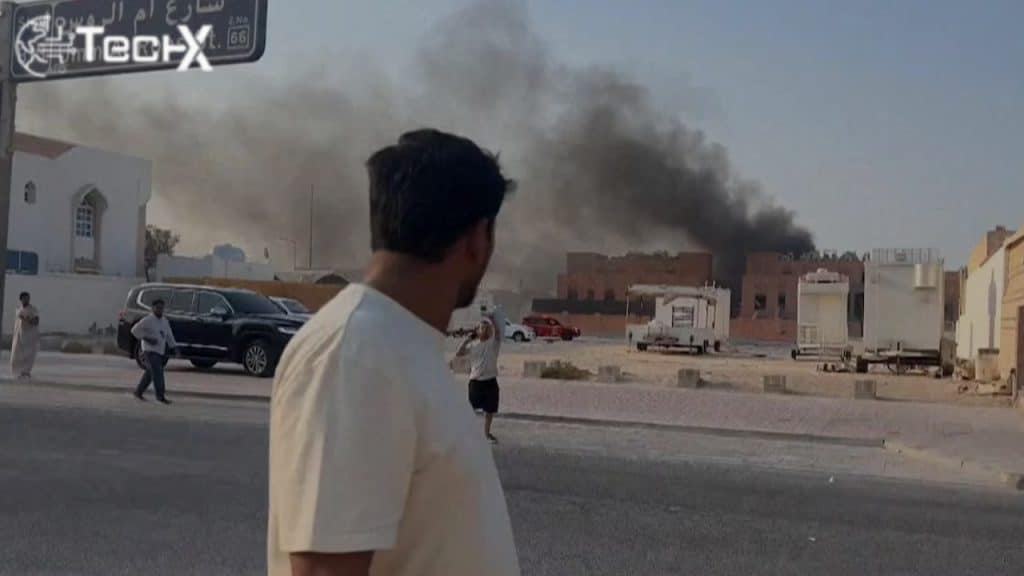Israel launched a strike targeting Hamas leaders in Qatar on Tuesday, shocking the region as officials confirmed the militant group’s leadership was holding discussions on a U.S.-backed Gaza ceasefire proposal. The sudden attack extended Israel’s military campaign far beyond Gaza, raising fears about the collapse of delicate negotiations intended to end the war and secure the release of Israeli hostages.
Black smoke rises over Doha’s skyline after a strike
Thick black smoke was seen rising over Doha, the Qatari capital, immediately after the strike. Authorities acknowledged the attack but withheld details about potential casualties. The assault marks the second time in two years that Qatar, an energy-rich Gulf state, has come under direct attack amid Middle Eastern wars. This escalation has left diplomats questioning whether ceasefire talks will continue at all.
United Nations condemns Israeli action in Qatar
U.N. Secretary-General Antonio Guterres swiftly condemned the strike, warning that such actions undermine peace efforts. He urged all sides to focus on achieving a permanent ceasefire rather than escalating violence. His remarks reflected widespread concern that targeting Hamas in Qatar could derail international mediation and further destabilize regional security, just as hopes were rising for progress in negotiations.
Israeli military cites precision and intelligence
Israeli military spokesman Col. Avichay Adraee indicated that Israel’s air force carried out the strike, using what he described as “precise munitions and additional intelligence.” Officials emphasized that Hamas leaders were directly responsible for the October 7 massacre in southern Israel and have since managed the war effort. The Israeli government later confirmed it intentionally targeted Hamas members in Qatar during active negotiations.
Mixed Israeli signals over Qatar’s mediation role
Throughout the war, Israeli officials have relied on Qatar to mediate with Hamas while simultaneously questioning Doha’s effectiveness in pressuring the militant group. After Tuesday’s strike, Israel reiterated its stance that Hamas’ leadership cannot be allowed safe refuge. The attack, however, raises doubts about whether Israel still values Qatar’s role as a mediator, given the direct challenge to its sovereignty.
Also Read: Pakistan and US Sign MoU on Critical Minerals Exploration
Qatar condemns Israeli “cowardly” assault
Qatar’s Foreign Ministry harshly condemned what it called a “cowardly Israeli attack” on Hamas’ political headquarters in Doha. Spokesman Majed al-Ansari described the assault as a “flagrant violation of international law and norms.” He added that Qatar would not tolerate actions that threaten its sovereignty or destabilize regional security. Officials vowed to respond diplomatically while ensuring national security measures remain heightened.
U.S. citizens in Qatar told to shelter-in-place
The U.S. Embassy in Qatar issued an urgent advisory for American citizens to shelter in place following the strike. Officials also restricted movements of embassy personnel. Washington’s concerns highlight the seriousness of the incident, particularly since Qatar hosts Al-Udeid Air Base, home to U.S. Central Command. The base itself had previously come under Iranian attack during earlier regional conflicts.
Netanyahu confirms Israeli responsibility
Israeli Prime Minister Benjamin Netanyahu took full responsibility for the strike, stressing that Israel alone initiated and carried it out. His statement came shortly after U.S. President Donald Trump warned Hamas over ceasefire delays. Netanyahu’s admission indicates Israel’s readiness to expand its campaign beyond Gaza, even if it risks damaging relations with regional allies or jeopardizing ongoing diplomatic mediation.
Regional reactions to Qatar strike emerge
The immediate regional response included strong condemnation from Gulf allies. Emirati Foreign Minister Abdullah bin Zayed Al Nahyan expressed “full solidarity” with Qatar in an online statement. The United Arab Emirates, despite its Abraham Accords normalization with Israel, has warned repeatedly that actions destabilizing the region could threaten the fragile peace established through the historic agreement five years earlier.
New U.S. ceasefire plan under discussion
Despite the strike, Arab officials confirmed a new U.S. proposal is on the table. Crafted by Trump’s envoy Steve Witkoff, the plan envisions the withdrawal of Israeli forces from Gaza once hostages are released and a ceasefire takes hold. Hamas has criticized the plan as a “humiliating surrender document,” but leaders agreed to deliberate and issue a formal response within days.
Egyptian mediation adds further complexity
Egyptian officials, who have played an essential role in ceasefire mediation, revealed that Hamas officials were scheduled to meet at the targeted location in Doha when the strike occurred. This timing has raised speculation about whether Israel sought to deliberately sabotage ongoing discussions. Egypt continues its efforts to salvage negotiations, though its officials admit the prospects for success appear increasingly uncertain.
Ceasefire hopes clouded by deep mistrust
The strike in Qatar has intensified mistrust among negotiating parties, casting doubt on whether ceasefire talks can meaningfully proceed. Mediators had previously focused on achieving temporary pauses in fighting linked to hostage releases. However, Israel’s latest action against Hamas leaders abroad complicates efforts to build confidence for a permanent truce. The coming days will reveal whether diplomacy can overcome this dramatic escalation.
